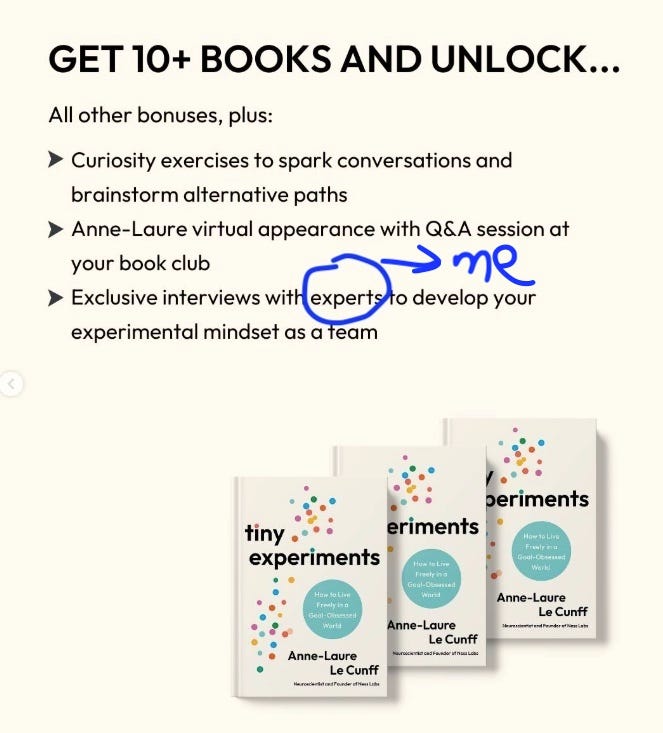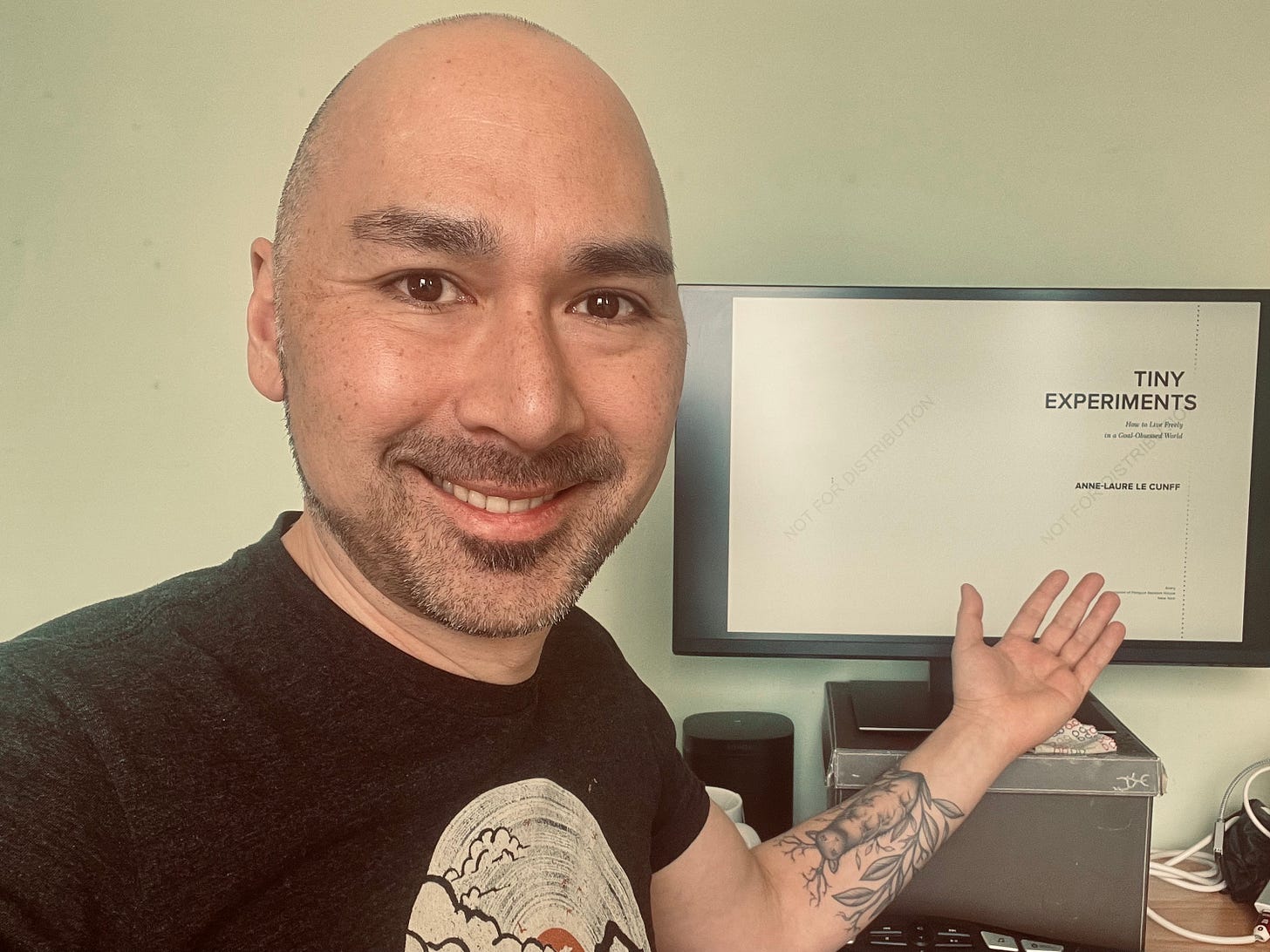Issue 9: Can Tiny Experiments Unlock Creativity and Curiosity at Work?
A newsletter inspired by Anne-Laure Le Cunff's new book, Tiny Experiments
A couple of weeks ago, I got an email from fellow researcher and Fishbowl reader Anne-Laure Le Cunff. For those of us who write social science newsletters, that’s an exciting name to see in your in-box: She’s the neuroscientist who founded the immensely popular Ness Labs newsletter that covers topics near and dear to my heart, including curiosity, creativity, and experimentation.
However, she didn’t realize that she and I share more than our research interests in creativity, learning, and experimentation: We are imprint siblings at Avery. I first learned about her work through Jacob Surpin, who edited both of our respective books.
Thus, I got a chance to read an advance copy of Anne-Laure’s new book, Tiny Experiments: How to Live Freely in a Goal Obsessed World. The title should give you a good sense of its message (as all well-crafted titles do). For understandable reasons, the self-help genre loves goals. Heck, I love goals! But Anne-Laure explains a clear, deep truth hidden beneath the message of SMART goal acolytes—nothing in life is a linear progression. Instead, our lives are marked by peaks and valleys, whirlpools, stops and starts, and tortured mixed metaphors.
Which all sounds a lot like the scientific method!
Tiny Experiments encourages us to embrace life’s fractal unfolding and to conduct…tiny experiments. And that encouragement is backed with solid science. It’s a fabulous book and you should read it.
But, strangely, our shared publisher/editor isn’t what led her to my inbox. Instead, she had reached out because of our shared interests in creativity and improvisation. She wanted to discuss how curiosity helps teams succeed and how to navigate uncertainty in organizations.
As a result of that conversation, I was tangentially involved in Tiny Experiments! If you pre-ordered 10+ books, you gained access to “exclusive interviews with experts” — including yours truly!

In the spirit of tiny experiments, I’m going to try something new with this newsletter - riffing off of my conversation with Anne-Laure and sharing a few research insights that occurred to me after our conversation. These insights spotlight the complexities of pursuing our curiosity and creativity at work. It isn’t just for fun — it’s about managing the inherent uncertainty of the modern world.
Insight 1: Ambivalent feedback—feedback that includes both positives and negatives—leads curious people to be more creative.
Source: Harrison, S. H., & Dossinger, K. 2017. Pliable Guidance: A Multilevel Model of Curiosity, Feedback Seeking, and Feedback Giving in Creative Work. Academy of Management Journal, 60(6): 2051–2072.
Key Quote:
“More curious individuals seek feedback by asking more open questions, which allows them to obtain more feedback. We also find that ambivalent feedback is more likely to lead to feedback acceptance and design revision. Finally, our results suggest that curiosity is an important moderator of how creative workers respond to ambivalent feedback.”
Insight 2: Curious leaders encourage subordinates to speak up. But, unfortunately, the effect is stronger for men than for women.
Source: Thompson, P. S., & Klotz, A. C. 2022. Led by curiosity and responding with voice: The influence of leader displays of curiosity and leader gender on follower reactions of psychological safety and voice. Organizational Behavior and Human Decision Processes, 172: 104170.
Key Quote:
“When leaders display curiosity, it signals to followers that the environment is safe for taking risks associated with being inquisitive at work. At the same time, because displays of curiosity are communal in nature, social role theory and the communality-bonus effect combine to indicate that curiosity’s effects should be stronger for followers of male leaders versus followers of female leaders.”
Insight 3: Curiosity at work is a double-edged sword. We often focus on its positives, but overlook its potential negatives. Don’t blindly encourage others to follow their curiosity!
Source: Kashdan, T., Harrison, S. H., Polman, E., & Kark, R. 2023. Curiosity in organizations: Addressing adverse reactions, trade-offs, and multi-level dynamics. Organizational Behavior and Human Decision Processes, 179: 104274.
Key Quote:
“There is a strange disconnect in how leaders and co-workers encourage curiosity yet often experience an adverse reaction during or after its occurrence. There is also a strange asymmetry in the field such that curiosity is often described as a universally positive asset/trait yet there are costs that are worthy of consideration such as decision-making speed (i.e., trade-offs). Depending on the type of curiosity and mode of expression, curiosity can have bright, dark, or mixed consequences.”
Insight 4: Improvising at Work is Scary…but Often Necessary
Source: Fisher, C. M., & Barrett, F. J. 2019. The experience of improvising in organizations: A creative process perspective. Academy of Management Perspectives, 33(2): 148–162. (hey, that’s me!)
Key Quote:
“That experience is both fearful and exhilarating, holding within it both the possibility of transcendence and failure….The question is not necessarily whether improvising routinely makes you feel good; clearly, it often does not. Rather, the question is what happens when it is absent. Although humans may be able to live without improvising, minimizing the opportunity to do so in organizations or forcing people to hide it can reduce the opportunity to experience a central tension in life, one that provides the opportunity to learn, grow and create.”
(Shoutout to the many friends-of-the-blog who conducted all this fabulous research: Spencer Harrison, Karyn Dossinger, Anthony Klotz, Frank Barrett, and
, as well as those coauthors who I don’t know! Please check out Todd’s newsletter )What does it all mean?

Creativity at work isn’t just about inspiration—it’s about having the courage to explore the unknown. That’s why curiosity, feedback, and improvisation matter. They aren’t just nice-to-haves; they’re essential for navigating an unpredictable world. Tiny experiments help us bridge the gap between ideas and action. So the question isn’t just whether you should experiment at work—it’s whether you can afford not to.
Yet, experimentation is messy and scary. It is so scary that people sometimes hide their improvisation and creativity at work. It takes effort for leaders to cultivate that crucial sense of psychological safety - that the workplace is a safe place to experiment and take risks.
If you want to invite more curiosity and experimentation into your life, I encourage you to go read Tiny Experiments.
What’s one tiny experiment you’ve tried at work? What happened?
(And please comment, like, and share - it really does help)
Related Posts
Issue 2: The Nature of Creativity
I came down to the basement and turned on the lights. And I saw them: Sweat-sock snowmen. So. Many. Sweat-sock snowmen. How did they get there? What did they want? Blood? Sweat? Feet?!







I love the idea of "tiny experiments" and just ordered my copy! Thank you for bringing it to my attention. Also, I couldn’t help but laugh at the image with "experts" circled and your handwritten note saying "me." Gave me a chuckle. Excellent read. Thanks again!
Thank you, Dr Collin Fisher, for sharing your insights regarding tiny experiments. I really like this insight: "Tiny experiments help us bridge the gap between ideas and actions. So the question is not just whether you should experiment at work - it's whether you can afford not to." I couldn't agree more. The question is, I know I can afford to take that plunge. But then, what's next?
This path is definitely going to be full of small triumphs, but also countless setbacks. While small successes indeed fuel our motivation to pursue greater creativity as Professor Teresa Amabile wisely commented above, the ability to learn from what might seem like "failures" is equally, if not more, crucial. This skill of learning from setbacks is what will keep us persistent throughout the journey from turning an idea into action. In my experience, every setback contains valuable lessons. They teach us to adapt, refine our approaches, and not give up easily. Without this capacity, we might be deterred by the first sign of trouble and never fully realize the potential of our ideas. That's why I believe we really need to work on developing our ability to learn from what might seem like "failures". I'm not even sure if it's right to label them as failures, because I like to think of them as really valuable growth experiences. Once again, thank you for your insights! Look forward to your next post!